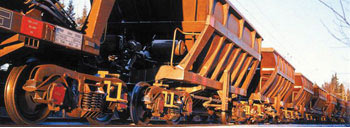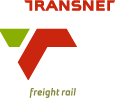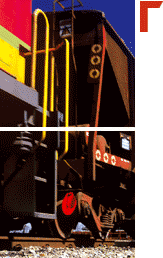
Mr. Siyabonga Gama, CE of Transnet Freight Rail
Transnet Freight Rail's Purchase of 32 New Locomotives for the Iron Ore Line
I am pleased to announce that several months of negotiations have eventually culminated in this gathering - the signing of an agreement between Transnet and VENUS RAILWAY SOLUTIONS PTY LIMITED (VENUS). The agreement provides for the supply of 32 new class 15E electric locomotives for the Iron Ore line at a total cost of R1.12 billion. Delivery of these locomotives will be between March and November 2009.
The 861-kilometre Iron Ore railway line runs from Sishen to Saldanha. It is a purpose built single, heavy haul line carrying export iron ore. The line was built in 1974 by Iscor, which was originally the sole Iron Ore exporter and was built to carry 18 million tonnes per annum. Transnet Freight Rail took over the line in 1977.
During the past few years demand increased from 18 to 29 million tonnes per annum. This capacity is to be systematically increased to 41 million tonnes by October 2007; 47 million tonnes by April 2009; approximately 65 million tonnes by October 2011 and eventually +/- 88 million tonnes by October 2013. Our Board has approved the expansion to 47 million tonnes per annum making our investment in this channel over the next 3 years R5.8 billion for rail expansion and port terminal upgrades. The staged capacity increase to 65 million tonnes is currently in feasibility phase and that of 88 million tonnes in pre-feasibility.
Transnet Freight Rail is currently ramping-up capacity to the 41 million tonnes, with 35 million tonnes allocated to Kumba and 6 million tonnes to Assmang. We are investigating increasing the train length from the current 216 wagons per train to 342 wagons to increase capacity which would make this the longest train in the world - another first for South Africa. Furthermore, wagon carrying capacity of all wagons will be increased to 100 tonnes. Infrastructure capacity will also be increased by extending the Salkor yard, electric locomotive workshop and lengthening of train crossing loops. The company will also build and upgrade additional wagons and locomotives.
This agreement today marks the second major investment in Transnet Freight Rail's projected R31 billion capital investment programme for the next 5 years. The first was the purchase of 110 locomotives, which was signed in February of this year, for the Coal Line. The new locomotives for the Iron Ore line will augment the current 31 class 9 E's and enable us to phase out the 80 diesel locomotives on the Ore line which are not possessed of the world class reliability demanded on the ore line and are also fuel inefficient. This new investment in locomotive capacity will ensure enhanced throughput and reduced operating costs.
Transnet Freight Rail will not flinch from its commitment to delivery, and thus remains committed to sustaining the competitive advantage that the Iron Ore line provides to our customers. The rail operation provides world-class and highly efficient heavy haul transportation of Iron Ore, a fact that we are extremely proud of. And these new locomotives will go a long way towards ensuring that we remain at the forefront of international heavy haul operations.
These new class 15E locomotives will be the most powerful in our fleet and will also have a high availability and reliability. The locomotives are 50 kilo Volt (kv) and have tractive effort, that is pulling power, of 480-kilo Newton (kN). Compared with the 383 kN on the present 9E locomotives serving the ore line, this implies 25% more power. They will run in distributed power mode in a train set made up of 3 distinctive blocks - each block of 114 wagons having a locomotive on each end. Fitted with an electronic brake system and radio distributed power, the locomotives in the middle and rear end of the train can be remote controlled.
The new locomotives will be equipped with the latest technological innovations, which will be driven by Toshiba's GPRS systems. These innovations will include black box technology; touch screen control displays and ergonomics through which trip and technical data will be monitored and automatically downloaded via wayside readers as the locomotives enter home depots. This new technology will necessitate that our train drivers undergo additional training to acquire the requisite skills to operate the new locomotives safely and efficiently.
This investment is in line with our strategy to lead and vigorously drive supply chain transformation to unleash rail efficiency at internationally competitive prices. Our country's logistic system plays a critical role in positioning our economy in a globally competitive domain. In this regard, we shall continue to collaborate with the mining houses to optimise and leverage productive capacity by reducing transit times, thus freeing additional capacity from our people and our other assets.
As Transnet Freight Rail rolls out its 5-year R31.5 billion capital expenditure programme, we will ensure that this investment promotes meaningful BEE and the growth of local industries. The deal that we are signing today, I'm pleased to say, meets these criteria.
Venus is a special purpose vehicle between Mitsui and Co. Limited, Sibambene Trade and Services Holdings (Pty) Limited and African Sky Innovative Solutions (Pty) Limited. MITSUI has a 55% share in the company and the BEE partners own the remaining 45%. The main subcontractors are Union Carriage and Wagon Partnership, made up of Duduza Rail and Union Carriage and Wagons, and Toshiba, a major Japanese locomotive manufacturer. In fact, there are approximately 43 companies involved in this project with BEE ranging from 5% to 100%.
For us, improving service delivery and efficiencies through best practice, technological innovations and capacity building within our workforce, is a major source of inspiration. We assure you that the Iron Ore line is up to the task of meeting the expectations of our customers as we release critical capacity to ensure growth of export markets.
I would like to extend my congratulations to VENUS and its partners, and indicate that this agreement will be a partnership built on trust, respect and a commitment to succeed. Such a partnership is designed to improve the quality of Transnet Freight Rail and to contribute positively to growth and prosperity.

